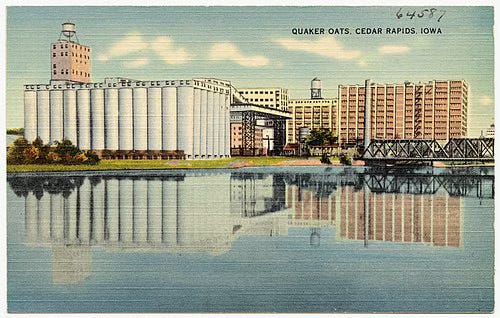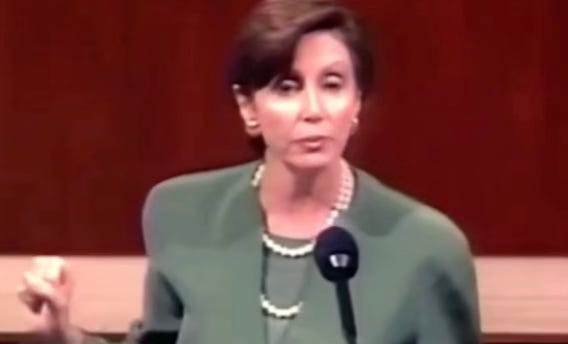In Iowa, there’s worry about supposed “liberation”
Trump’s tariffs are roiling the stock market. In the heartland, there’s a big question of whether they’ll serve their intended purpose
Last week 650 workers were laid off from their jobs at a Whirlpool Plant in Amana, Iowa.
Another 160 workers in Dubuque, Iowa learned their company, ASM Global, would close, ending their jobs.
And 130 workers at Sodexo, Inc. in Decorah, Iowa learned they would lose their jobs too.
This all happened the same week as President Donald Trump stood outside at a cold White House Rose Garden event and announced significant tariffs on the rest of the world. “Liberation Day,” as he promised history would recall, was a shock to the markets. With none of the world spared, President Trump spoke against free trade. He would enact substantial tariffs, promising, as he has long believed, that this will move jobs back to the United States.
In Iowa, though, the opposite was underway: Significant layoffs in almost every corner of the state.
Todd Waddell, the local business agent of the machinists, worked at the Whirlpool plant in Amana for 36 years, he said at a press conference in Iowa on Friday. Those who lost their jobs were members of our community, neighbors, friends, he said. And those remaining are worried about their jobs, he relayed.
Union leaders also worried about the state government’s 2022 cuts to unemployment. With so many newly out of work, 16 weeks of partial wages will go by quickly. They advocated for a return to the 26 week unemployment option. And they worried about their members, especially those newly informed of layoffs, the new plant closures and shrinking, and when and if these promised new jobs would arrive.
Uncertainty
When I spoke to Rick Moyle, the executive director of the Hawkeye Area Labor Council last week he wasn’t optimistic about the tariffs bringing jobs back to Iowa to replace those just lost.
“This has created a level of uncertainty within the economy and I mean that's a plain to see,” Moyle said of Trump’s tariffs. “If they don't get things under control to where business can actually forecast with some level of certainty, yeah absolutely we're going to see more of this. We're going to see effects on the economy and we're going to see job loss.”
Moyle, who has served as the Council’s Executive Director for almost 14 years, was a machinist himself. He worked for 16 years at Terex Cedarrapids, where his father had also worked. This was before the company consolidated manufacturing and Moyle himself faced the situation so many he is advocating for now face. He knows the journey of a layoff, and a job transition.
The Whirlpool plant, which announced the 650 layoffs, is cutting about a third of its workforce, just outside of Cedar Rapids, Iowa.
Cedar Rapids is a city in Iowa where you can literally smell manufacturing in the air. There’s Quaker Oats, General Mills, Cargill.
“If you take a look at making cereal, whether it's General Mills or Quaker Oats, 90% of our oats we get from Canada,” Moyle said. “I mean, so at some point, now a lot of these companies stockpiled before, leading up to it, but when that's over with and they have to purchase, if there's still this level of uncertainty, what are they going to do?” he said.
He added that if they do not have the product — or refuse to pay for it — labor is the first cut. “I mean that’s the first thing that goes everywhere,” he said.
Of the moment and what to expect:
“We want policy that's going to help working American families, period,” he said. “No matter who comes up with it, we want good policy. We want good regulation. We want good law. We want protections. That's what we want. And we really do not care who gives it.”
But Moyle, who has seen firsthand a trifecta of single party rule in Iowa for the last 8 years, hasn’t seen policies that protect union employees, rather there has been a steady attack of union rights. And while rhetoric at the national level leads many to believe the efforts underway are designed to support organized labor, Moyle is worried about some of the new administration’s actions when it comes to organized labor. For example President Trump has been trying to axe Gwynne Wilcox of the National Labor Relations Board, a critical body to getting a fair hearing on workers’ rights abuses.
Trump’s Tariffs
President Donald Trump has long vowed that other countries are abusing the generosity of the United States. In 1987 he spent almost $95,000 on full page newspaper ads addressing the issue.
In an open letter to the American people he said, in part “Japan and other nations have been taking advantage of the United States” adding “Why are these nations not paying the United States for the human lives and billions of dollars we are losing to protect their interests?"
“Let’s help our farmers, our sick, our homeless by taking from some of the greatest profit machines ever created – machines created and nurtured by us. ‘Tax’ these wealthy nations, not America.”
He rose to power in both elections saying much the same. It was nearly 40 years after he first ran that ad that he stood outside at the Rose Garden and announced major changes to US tariff policy. His language could have been from 40 years earlier.
“For decades, our country has been looted, pillaged, and plundered by nations near and far, both friend and foe alike. American steelworkers, auto workers, farmers and skilled craftsmen … they really suffered gravely,” Trump said. “They watched in anguish as foreign leaders have stolen our jobs, foreign cheaters have ransacked our factories, and foreign scavengers have torn apart our beautiful American dream.”
Trump is not the only politician to doubt the benefits of free trade to the US economy. Breitbart among other right leaning media organizations replayed a speech Nancy Pelosi gave in 1996 when she stood against reauthorizing China’s most favored nation trading relationship.
President Jimmy Carter initially negotiated to normalize trade with China, believing it would help free the Chinese people. China followed suit by killing its citizens when they protested.
Over the following years trade with China was heavily debated, and while there were efforts in Congress to admonish China and tie most favored nation status to human rights and other areas, President George H.W. Bush ultimately vetoed Congress’ efforts in 1992. It didn’t end the debate.
When NAFTA was passed in 1993, the majority of the opposition came from Democrats concerned about labor. Some notable opponents included Bernie Sanders, Barbara Boxer, and Dick Gephardt.
In 1996 Pelosi questioned whether free trade had made the world freer or fairer.
Liberation?
The world’s trade balance, or imbalance, wasn’t created overnight, or with the actions of one administration or one voice.
But in one day, in one event, President Trump announced drastic action, promising this would bring jobs back to the US, without clear evidence of how companies, many of which are reliant on global supply chains, could reshore their manufacturing or supply chains in a timeline or manner that would limit price spikes.
By Friday, President Trump was staying in Mar-A-Lago, golfing at a nearby club after he wrote on social media: “THIS IS A GREAT TIME TO GET RICH.”
In response, the stock market, which Trump used to use as an indicator of the economy, saw its worst week since the pandemic.
As American companies’ valuations continued to drop, Trump seemed unfazed, again emphasizing that in the long run he believes this policy will be welcome.
It was unclear at first whether he was open to negotiation. While he said his policies are here to stay, Elon Musk, who last week lost his multimillion dollar wish of an election result, shared his hope of free trade with Europe at an event Saturday. It was also unclear how the market would continue to react. As of today it’s starting to show upward momentum, and then reversed course.
One thing that isn’t unclear: 940 Iowans learned last week they will lose their jobs.
The all Republican leadership in Iowa seemed unfazed that the unemployment changes could very well be felt by many in their community. Iowa House Speaker Pat Grassley, the grandson of 91 year old Senator Chuck Grassley, said Republicans have no plans to adjust unemployment benefits in the wake of the layoffs.
“It’s all happening the same week as this supposed Liberation Day,” Rick Moyle says of the layoffs.
For the 940 employees in Iowa? So far the only thing they’ve been liberated from is their jobs. And the ticking clock of unemployment benefits will run out fast.







